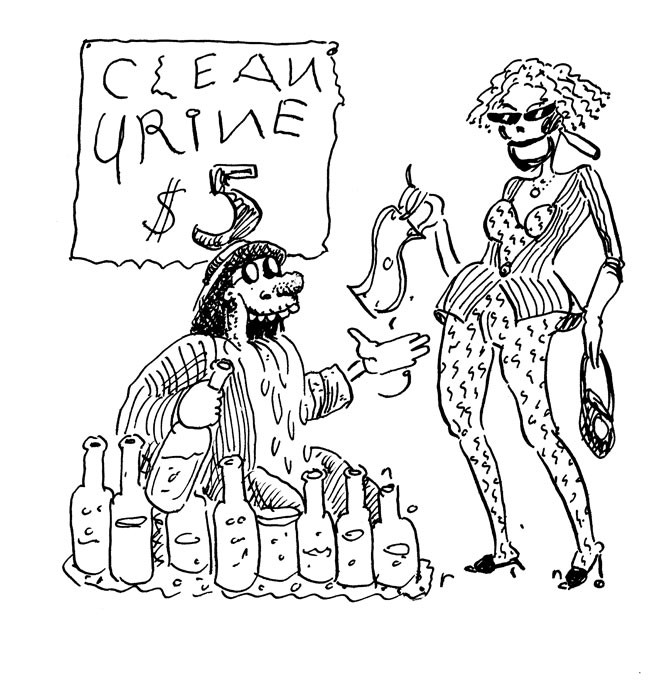
- Slug Signorino
When I interview for a professional job, the company usually has me sign a statement saying drug use is against company policy. Yet when I apply for a low-wage job they want to test me for drug use. What gives? Does drug testing work?—J.P.
At what point on the career ladder do most industries stop mandating drug testing? I just picked up cat food at PetSmart, where they proudly display on their doors that they test their employees. Does this include the CEO? Why test nurses, but not doctors? Why bank tellers but not the "masters of the universe"? Testing might serve a public-safety function for airline pilots and selected others, but for the folks that stock the bags of kitty crunchies? It seems like a subtle form of control over people in lower social and economic levels.—Ken
Asking somebody to pee in a cup is subtle? Maybe compared to being chained to an oar. You raise a good point about drug tests, though—there's definitely a low-grade class war going on here. However, the subset of the proletariat being lashed into submission isn't minorities or the poor (not for lack of trying). Rather, it's a demographic so oppressed even defenders like the ACLU dare not speak its name: stoners. OK, technically store clerks. But big business is seeing lots of overlap.
Workplace drug testing, like the war on drugs generally, was and is motivated by a tangled web of impulses—some legitimate, some pretty sketchy. The one few quarrel with is safety. Following the 1981 crash of a U.S. Marine jet on the carrier Nimitz, killing 14 and injuring 47, it came out that six of the dead tested positive for marijuana and that drug use was common on the ship and in the military overall. Although drugs didn't cause the crash (the plane's crew, or what could be found of it, tested clean), the Reagan administration established a zero-tolerance drug policy for U.S. military personnel, to be enforced by testing.
Things spread from there. Prodded by the feds, people all over were soon peeing into cups: civilian federal workers in sensitive jobs, federal contractors, employees in federally regulated industries such as transportation. Many private companies started testing on their own. By 1990, surveys by the U.S. Bureau of Labor Statistics found, 46 percent of worksites with more than 250 employees were administering drug tests.
The prevalence of testing varied widely by industry, the BLS discovered. At the top of the range with 72 percent was communications, transportation, and utilities, followed by construction and mining at 70 percent. At the bottom was finance, insurance, and real estate, with 23 percent. Aha, you say, the masters of the universe get a pass! I guess, but face it: While financial and other white-collar oopsies can cost you your retirement money, the blue-collar version can get you killed now.
And that's the thing: drug testing evidently does result in fewer people getting killed or hurt. General Motors reported a 50 percent reduction in workplace injuries after implementing a testing program. Southern Pacific Railroad saw an 86 percent reduction in worker injuries within five years after its program began. A nationwide study of truck drivers found a 24 percent reduction in alcohol-related fatalities.
But here's something else. According to the BLS figures, one industry was an exception to the rule that the likelihood of drug testing correlates with the potential for mayhem: wholesale/retail. The worst that can happen to the average stock clerk is you drop the jumbo Tide off the top shelf. But 54 percent of wholesale and retail worksites test for drugs.
Why? Browse around on drug-testing websites and you get a sense of the executive mindset: we don't trust these thieving peons. One drug-test equipment supplier says flatly, "80 percent of drug abusers steal from their workplace." (Source for this preposterous claim: a single small study published in 1994.) Others are less blatant, making noises about helping the afflicted get treatment and so on. Reducing workplace accidents is in there, but mostly what you see is stuff like this: "To convince 'casual users' that the cost of using is too high" and "establish grounds for discipline or firing." Translation: drug testing helps keep the slackers in line.
Big Brotherish? Yeah. A violation of your civil rights? Not unless you can make the case that you're part of a group that's being unfairly singled out. Civil liberties advocates are happy to whale on knuckleheads who propose drug-testing programs that are too obviously discriminatory—to cite one egregious example, mandatory testing for welfare recipients. One page from the ACLU site features a beef from a 40-year-old mother of three who was humiliated by being forced to produce a urine sample while an attendant watched; they contend such things are intrusive and bad for workplace morale, which gets no argument from me. But let's be clear: nobody's defending your right to be stoned on the job.
Still, we want to be fair, right? I wrote PetSmart asking if their CEO had submitted to drug testing. So far no response. If I hear something I'll let you know.
Send questions to Cecil via StraightDope.com or write him c/o Chicago Reader, 350 N. Orleans, Chicago 60654.